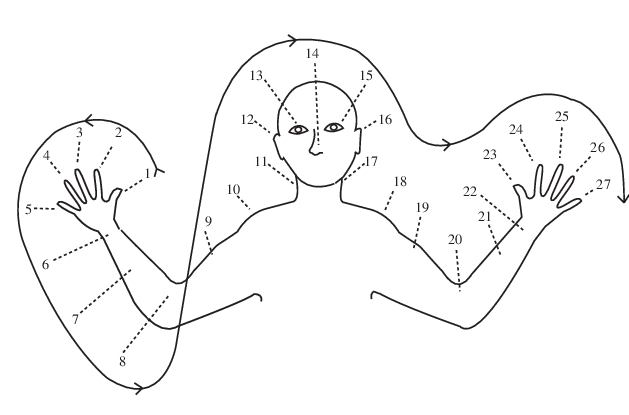In some nowadays Indo-European languages you can still see rests of base-20 numeral systems.
For example in France French:
Number — French spelling — English translation — Expansion (where possible)
70 — Soixante-dix — Sixty-ten
71 — Soixante-onze — Sixty-eleven
72 — Soixante-douze — Sixty-twelve
73 — Soixante-treize — Sixty-thirteen
74 — Soixante-quatorze — Sixty-fourteen
75 — Soixante-quinze — Sixty-fifteen
76 — Soixante-seize — Sixty-sixteen
77 — Soixante-dix-sept — Sixty-seventeen — Sixty-ten-seven
78 — Soixante-dix-huit — Sixty-eighteen — Sixty-ten-eight
79 — Soixante-dix-neuf — Sixty-nineteen — Sixty-ten-nine
80 — Quatre-vingts — Four-twentys
81 — Quatre-vingt-un — Four-twentys-one
82 — Quatre-vingt-deux — Four-twentys-two
83 — Quatre-vingt-trois — Four-twentys-three
84 — Quatre-vingt-quatre — Four-twentys-four
85 — Quatre-vingt-cinq — Four-twentys-five
86 — Quatre-vingt-six — Four-twentys-six
87 — Quatre-vingt-sept — Four-twentys-seven
88 — Quatre-vingt-huit — Four-twentys-eight
89 — Quatre-vingt-neuf — Four-twentys-nine
90 — Quatre-vingt-dix — Four-twentys-ten
91 — Quatre-vingt-onze — Four-twentys-eleven
92 — Quatre-vingt-douze — Four-twentys-twelve
93 — Quatre-vingt-treize — Four-twentys-thirteen
94 — Quatre-vingt-quatorze — Four-twentys-fourteen
95 — Quatre-vingt-quinze — Four-twentys-fifteen
96 — Quatre-vingt-seize — Four-twentys-sixteen
97 — Quatre-vingt-dix-sept — Four-twentys-seventeen — Four-twentys-ten-seven
98 — Quatre-vingt-dix-huit — Four-twentys-eighteen — Four-twentys-ten-eight
99 — Quatre-vingt-dix-neuf — Four-twentys-nineteen — Four-twentys-ten-nine
Note: There is a process of elision of the s on Quatre-vingts when it has a number after it.
This happens because the Gauls, a celtic people, had a base-20 counting system. In my personal opinion, it is strange that the forms septante, huitante and nonante, used in Swiss French sound outdated in almost all the French territory. Shouldn't things evolve exactly in the opposite sense, towards simplicity?
Danish numbers employ a similar, though slightly more complex, mechanism:
Number — Danish normal form — Danish full, archaic form (deconstructed origin of full form) — English literal translation — Loose English translation
50 — halvtreds — halvtredsindstyve (halv-tredje sinds tyve) — half-third times twenty — 2.5 times twenty
60 — tres — tresindstyve (tre sinds tyve) — three times twenty
70 — halvfjerds — halvfjerdsindstyve (halv-fjerde sinds tyve) — half-fourth times twenty — 3.5 times twenty
80 — firs — firsindstyve (fire sinds tyve) — four times twenty
90 — halvfems — halvfemsindstyve (halv-femte sinds tyve) — half-fifth times twenty — 4.5 times twenty
Notes: (1) Outside numbers, sinde is obsolete as a multiplicative. (2) Outside the full number forms, this ‘subtractive’way of forming ‘half numbers’ by prepending ‘half’ before the next ordinal number (half-third = two whole + half of the third) is obsolete except for halvanden ‘one and a half’. (3) The short forms are the normal forms for cardinals; ordinals are officially based on the full forms (halvtredsindstyvende ‘fiftieth’, etc.), but especially among younger people may be based on the short forms colloquially (halvtredsende).
We can see also that in other languages, like Portuguese and English that the twenty numbers between 11 and 19 are spelt on a different form than 21 to 99, which may be some
hint of a past vigesimal system
Number — Portuguese — English
11 — onze — eleven
12 — doze — twelve
13 — treze — thirteen
14 — catorze — fourteen
15 — quinze — fifteen
16 — dezasseis — sixteen
17 — dezassete — seventeen
18 — dezoito — eighteen
19 — dezanove — nineteen
As you can see, in Portuguese, you say 24 as vinte e quatro , literally twenty and four, but you don't say 14 as unte e quatro or deste e quatro (in Portuguese: 1=um; 10=dez)
The same reasoning goes for English: you say twenty-four for 24, but you don't say onety-four or tenty-four for 14.
And, in German, the numbers between 21 and 99 have their position changed when spelt. So for 24 you say vier-und-zwanzig, literally four-and-twenty. This also does not happen between 11 and 19, the system also seems the previous ones. This can also indicate a historic link to a 20-base numeral system.
By the way, spelling 24 in German, seems spelling 80 in French!
